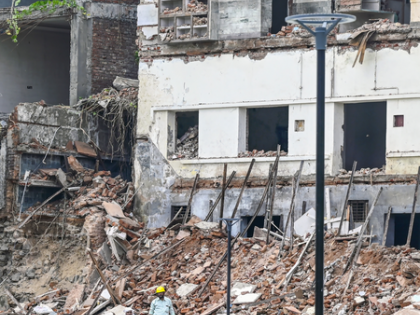NHRC takes suo motu cognisance of death of 3 labourers in Delhi building collapse incident
By IANS | Updated: August 26, 2025 13:30 IST2025-08-26T13:20:41+5:302025-08-26T13:30:17+5:30
New Delhi, Aug 26 The National Human Rights Commission (NHRC) has taken suo motu cognisance of media reports ...

NHRC takes suo motu cognisance of death of 3 labourers in Delhi building collapse incident
New Delhi, Aug 26 The National Human Rights Commission (NHRC) has taken suo motu cognisance of media reports that three labourers died and several others narrowly escaped when part of an under-construction four-storey building collapsed last week in central Delhi’s Daryaganj.
Taking note of press reports, the apex human rights body said the contents, if true, raise serious concerns of human rights violations.
The NHRC issued notices to the Chief Secretary; Commissioner, Municipal Corporation of Delhi (MCD); and Deputy Commissioner of Police, Central Delhi, and called for a detailed report on the matter within two weeks.
According to media reports, the incident occurred on August 20, with around 15 labourers present at the site.
The preliminary probe indicated that the incident occurred while the building was being demolished.
The injured were taken to Lok Nayak Jai Prakash Narayan Hospital (LNJP), where they were declared dead. The deceased were identified as Zubair, Gulsagar, and Taufiq, who were working at the site when the structure suddenly gave way.
The deceased were migrant workers from Bihar.
Soon after the incident, NDRF teams joined the rescue operation, assisting the police, fire brigade, and DDMA personnel.
A case was registered against the building owner and the contractor.
Established under the Protection of Human Rights Act, 1993, the NHRC, an autonomous statutory body, is an embodiment of India's concern for the promotion and protection of human rights. Its primary role is to protect and promote human rights, defined as the rights relating to life, liberty, equality, and dignity of individuals guaranteed by the Constitution or embodied in the International Covenants and enforceable by courts in India.
The apex human rights body has the power to take suo motu (on its own motion) action based on media reports, public knowledge or other sources, without receiving a formal complaint of human rights violations.
Disclaimer: This post has been auto-published from an agency feed without any modifications to the text and has not been reviewed by an editor
Open in app